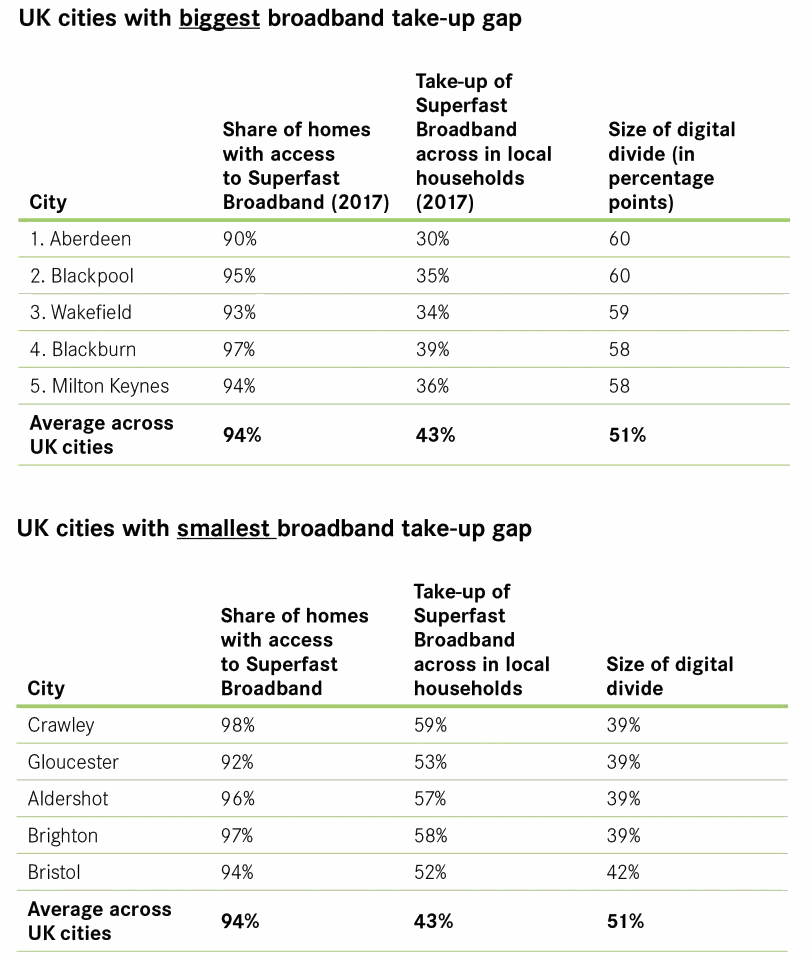Local Policy Changes Needed to Boost 5G and Full Fibre in UK Cities
The Centre for Cities think tank, which is supported by O2, has published a new report that recommends what cities across the United Kingdom need to do in order to facilitate the rollout of next generation “full fibre” (FTTP/H) ultrafast broadband ISP technologies and future 5G Mobile networks.
On top of that the report highlights that many UK cities are not taking full advantage of their existing digital connections and also points toward the problem of take-up, where “superfast broadband” (30Mbps+) connections are often available and yet many people continue to use slower services (this appears to be largely based off older 2017 data from Ofcom).

Advertisement
We should point out that a number of common factors can impact take-up, such as higher prices for faster services, customers being locked into long contracts with their existing ISP (can’t upgrade immediately) and a lack of general awareness (locals don’t always know that the faster service exists) or interest in the new connectivity (if you have a decent ADSL2+ speed and only basic needs then you might feel less inclined to upgrade).
The fear of switching to a different ISP may also obstruct some services. In other cases the new service may run out of capacity (i.e. demand is higher than expected), which means that people who want to upgrade are prevented from doing so until the problem is resolved (this is usually only a temporary problem for a small minority of areas).
Andrew Carter, CEO of Centre for Cities, said: “We need a concerted effort from national and local leaders to ensure cities can provide the best possible built environment to deliver new digital infrastructure in the coming years, such as the rollout of full fibre and 5G. Other cities and countries across the world have ambitious plans to capitalise on digital technology – UK cities must do the same to compete.”
Key Recommendations
Making the most of existing digital connections:
* The Government should deliver on its promise to devolve responsibility for the Adult Skills Budget to cities. This would give places more resources to help residents acquire the digital skills needed to take advantage of jobs resulting from digital connectivity. It will also ensure that firms can access the workers they need to capitalise on these developments.
* Cities should embrace the opportunities that existing digital technology offers to better manage services. For example, Salford City Council has adopted a ‘digital first’ customer strategy, making it easier for residents to interact with the council on public services, and upskilling staff to use digital technology. Other cities should also consider how they can use digital connections to innovate and transform public services.
Delivering new digital infrastructure in the coming years:
* The Government’s new National Planning Policy Framework (NPPF) should require all new housing developments to include provision of high quality digital infrastructure – mobile and fixed. This will reduce disruptions, costs and delays to the delivery of new digital connections. Cities should also integrate plans for full fibre and 5G into future public realm developments.
* National leaders should review the Electronic Communications Code (ECC) after 12 months, to ensure it does not deter investment in digital infrastructure. The ECC was introduced by the Government last year to cut costs and delays in new digital infrastructure, but has reduced cooperation between landowners and mobile operators. The Government should ensure these issues do not hamper ongoing delivery of 4G and rollout of 5G in UK cities.
The report broadly also recommends that cities integrate plans for full fibre and 5G connectivity into any future public realm developments (e.g. considering how lampposts might be used) and work together to share problems in order to improve procurement (this could reduce the costs and increase the diffusion of digital innovation across the public sector and from the private sector).
Advertisement
Delivering change report (PDF)
http://www.centreforcities.org/../make-the-most-of-digital-connections-final-1.pdf
Mark is a professional technology writer, IT consultant and computer engineer from Dorset (England), he also founded ISPreview in 1999 and enjoys analysing the latest telecoms and broadband developments. Find me on X (Twitter), Mastodon, Facebook, BlueSky, Threads.net and Linkedin.
« ISP BT Launch New 9 Month Broadband Packages for UK Students

















































Comments are closed